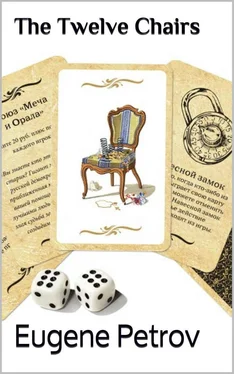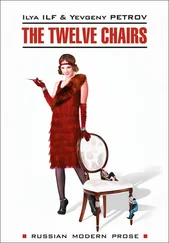Eugene Petrov - The Twelve Chairs
Здесь есть возможность читать онлайн «Eugene Petrov - The Twelve Chairs» весь текст электронной книги совершенно бесплатно (целиком полную версию без сокращений). В некоторых случаях можно слушать аудио, скачать через торрент в формате fb2 и присутствует краткое содержание. Год выпуска: 2013, Жанр: Юмористическая проза, на английском языке. Описание произведения, (предисловие) а так же отзывы посетителей доступны на портале библиотеки ЛибКат.
- Название:The Twelve Chairs
- Автор:
- Жанр:
- Год:2013
- ISBN:нет данных
- Рейтинг книги:5 / 5. Голосов: 1
-
Избранное:Добавить в избранное
- Отзывы:
-
Ваша оценка:
- 100
- 1
- 2
- 3
- 4
- 5
The Twelve Chairs: краткое содержание, описание и аннотация
Предлагаем к чтению аннотацию, описание, краткое содержание или предисловие (зависит от того, что написал сам автор книги «The Twelve Chairs»). Если вы не нашли необходимую информацию о книге — напишите в комментариях, мы постараемся отыскать её.
Find traces of a separate headset difficult and heroes face different adventures and troubles.
The Twelve Chairs — читать онлайн бесплатно полную книгу (весь текст) целиком
Ниже представлен текст книги, разбитый по страницам. Система сохранения места последней прочитанной страницы, позволяет с удобством читать онлайн бесплатно книгу «The Twelve Chairs», без необходимости каждый раз заново искать на чём Вы остановились. Поставьте закладку, и сможете в любой момент перейти на страницу, на которой закончили чтение.
Интервал:
Закладка:
the noise of the siren and burned up with curiosity, would chase after it.
But from time to time Polesov was seized by a mood of practical
activity. For several days he used to shut himself up in his workshop and
toil in silence. Children ran freely about the yard and shouted what they
liked, carters described circles in the yard, carts completely stopped
entangling their axles and fire-engines and hearses sped to the fire
unaccompanied-Victor Mikhailovich was working. One day, after a bout of this
kind, he emerged from the workshop with a motor-cycle, pulling it like a ram
by the horns; the motor-cycle was made up of parts of cars,
fire-extinguishers, bicycles and typewriters. It had a one-and-a-half
horsepower Wanderer engine and Davidson wheels, while the other essential
parts had lost the name of the original maker. A piece of cardboard with the
words "Trial Run" hung on a cord from the saddle. A crowd gathered. Without
looking at anyone, Victor Mikhailovich gave the pedal a twist with his hand.
There was no spark for at least ten minutes, but then came a metallic
splutter and the contraption shuddered and enveloped itself in a cloud of
filthy smoke. Polesov jumped into the saddle, and the motor-cycle,
accelerating madly, carried him through the tunnel into the middle of the
roadway and stopped dead. Polesov was about to get off and investigate the
mysterious vehicle when it suddenly reversed and, whisking its creator
through the same tunnel, stopped at its original point of departure in the
yard, grunted peevishly, and blew up. Victor Mikhailovich escaped by a
miracle and during the next bout of activity used the bits of the
motor-cycle to make a stationary engine, very similar to a real one-except
that it did not work.
The crowning glory of the mechanic-intellectual's academic activity was
the epic of the gates of building no. 5, next door. The housing co-operative
that owned the building signed a contract with Victor Polesov under which he
undertook to repair the iron gates and paint them any colour he liked. For
its part, the housing co-operative agreed to pay Victor Mikhailovich Polesov
the sum of twenty-one roubles, seventy-five kopeks, subject to approval by a
special committee. The official stamps were charged to the contractor.
Victor Mikhailovich carried off the gates like Samson. He set to work
in his shop with enthusiasm. It took several days to un-rivet the gates.
They were taken to pieces. Iron curlicues lay in the pram; iron bars and
spikes were piled under the work-bench. It took another few days to inspect
the damage. Then a great disaster occurred in the town. A water main burst
on Drovyanaya Street, and Polesov spent the rest of the week at the scene of
the misfortune, smiling ironically, shouting at the workmen, and every few
minutes looking into the hole in the ground.
As soon as his organizational ardour had somewhat abated, Polesov
returned to his gates, but it was too late. The children from the yard were
already playing with the iron curlicues and spikes of the gates of no. 5.
Seeing the wrathful mechanic, the children dropped their playthings and
fled. Half the curlicues were missing and were never found. After that
Polesov lost interest in the gates.
But then terrible things began to happen in no. 5, which was now wide
open to all. The wet linen was stolen from the attics, and one evening
someone even carried off a samovar that was singing in the yard. Polesov
himself took part in the pursuit, but the thief ran at quite a pace, even
though he was holding the steaming samovar in front of him, and looking over
his shoulder, covered Victor Mikhailovich, who was in the lead, with foul
abuse. The one who suffered most, however, was the yard-keeper from no. 5.
He lost his nightly wage since there were now no gates, there was nothing to
open, and residents returning from a spree had no one to give a tip to. At
first the yard-keeper kept coming to ask if the gates would soon be
finished; then he tried praying, and finally resorted to vague threats. The
housing cooperative sent Polesov written reminders, and there was talk of
taking the matter to court. The situation had grown more and more tense.
Standing by the well, the fortune-teller and the mechanic-enthusiast
continued their conversation.
"Given the absence of seasoned sleepers," cried Victor Mikhailovich for
the whole yard to hear, "it won't be a tramway, but sheer misery!"
"When will all this end!" said Elena Stanislavovna. "We live like
savages!"
"There's no end to it. . . . Yes. Do you know who I saw today?
Vorobyaninov."
In her amazement Elena Stanislavovna leaned against the wall,
continuing to hold the full pail of water in mid-air.
"I had gone to the communal-services building to extend my contract for
the hire of the workshop and was going down the corridor when suddenly two
people came towards me. One of them seemed familiar; he looked like
Vorobyaninov. Then they asked me what the building had been in the old days.
I told them it used to be a girls' secondary school, and later became the
housing division. I asked them why they wanted to know, but they just said,
Thanks' and went off. Then I saw clearly that it really was Vorobyaninov,
only without his moustache. The other one with him was a fine-looking
fellow. Obviously a former officer. And then I thought. . ."
At that moment Victor Mikhailovich noticed something unpleasant.
Breaking off what he was saying, he grabbed his can and promptly hid behind
the dustbin. Into the yard sauntered the yard-keeper from no. 5. He stopped
by the well and began looking round at the buildings. Not seeing Polesov
anywhere, he asked sadly:
"Isn't Vick the mechanic here yet?"
"I really don't know," said the fortune-teller. "I don't know at all."
And with unusual nervousness she hurried off to her apartment, spilling
water from the pail.
The yard-keeper stroked the cement block at the top of the well and
went over to the workshop. Two paces beyond the sign:
ENTRANCE TO METAL WORKSHOP
was another sign:
METAL WORKSHOP
AND PRIMUS STOVE REPAIRS
under which there hung a heavy padlock. The yard-keeper kicked the
padlock and said with loathing:
"Ugh, that stinker!"
He stood by the workshop for another two or three minutes working up
the most venomous feelings, then wrenched off the sign with a crash, took it
to the well in the middle of the yard, and standing on it with both feet,
began creating an unholy row.
"You have thieves in no. 7!" howled the yard-keeper. "Riffraff of all
kinds! That seven-sired viper! Secondary education indeed! I don't give a
damn for his secondary education! Damn stinkard!"
During this, the seven-sired viper with secondary education was sitting
behind the dustbin and feeling depressed. Window-frames flew open with a
bang, and amused tenants poked out their heads.
People strolled into the yard from outside in curiosity. At the sight
of an audience, the yard-keeper became even more heated.
"Fitter-mechanic!" he cried. "Damn aristocrat!"
The yard-keeper's parliamentary expressions were richly interspersed
with swear words, to which he gave preference. The members of the fair sex
crowding around the windows were very annoyed at the yard-keeper, but stayed
where they were.
"I'll push his face in!" he raged. "Education indeed!"
While the scene was at its height, a militiaman appeared and quietly
Читать дальшеИнтервал:
Закладка:
Похожие книги на «The Twelve Chairs»
Представляем Вашему вниманию похожие книги на «The Twelve Chairs» списком для выбора. Мы отобрали схожую по названию и смыслу литературу в надежде предоставить читателям больше вариантов отыскать новые, интересные, ещё непрочитанные произведения.
Обсуждение, отзывы о книге «The Twelve Chairs» и просто собственные мнения читателей. Оставьте ваши комментарии, напишите, что Вы думаете о произведении, его смысле или главных героях. Укажите что конкретно понравилось, а что нет, и почему Вы так считаете.












